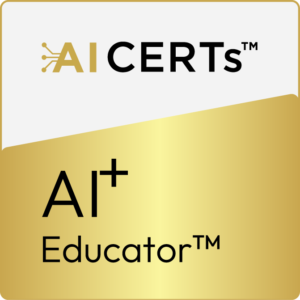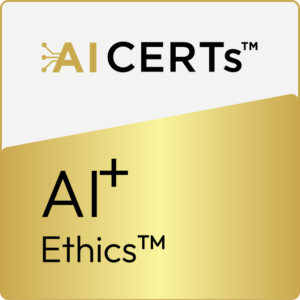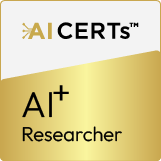Description
AI+ Human Resources (1 Day)
Program Detailed Curriculum
Executive Summary
The AI+ Human Resources™ Certification Course integrates AI technologies with HR practices.
Participants
learn
data-driven
recruitment
strategies,
AI-enhanced
performance
management
techniques, and ethical considerations in HR. Practical sessions focus on implementing AI tools for talent
acquisition, leveraging machine learning for performance evaluation, and developing ethical guidelines
for AI usage. Graduates acquire skills to revolutionize HR practices, fostering efficiency, equity, and
innovation in workforce management amid the AI era. Gain a competitive edge in HR with AI integration.
Course Prerequisites
Basic understanding of human resource management principles
Familiarity with data analysis and interpretation
Knowledge of AI concepts and applications in business settings
Proficiency in using computer software and tools for data manipulation
A willingness to engage with technical subjects and apply AI technologies in the context of learning and
development.
Module 1
Foundations of Artificial Intelligence (AI) in HR
1.1 Introduction to AI Technologies
AI Basics: Overview of Artificial Intelligence, Machine Learning (ML), Deep Learning (DL), and Natural Language
Processing (NLP).
Understanding Algorithms: Introduction to the algorithms that power AI applications, focusing on their ability to
learn from data.
AI in Everyday Life: Real-world examples to illustrate how AI is already integrated into our daily routines, enhancing
personal and professional tasks.
1.2 AI’s Role in HR Evolution
From Traditional to Digital: A brief history of HR technology, highlighting the shift from manual processes to digital
automation, and now to AI-enhanced solutions.
Case Studies: Examination of milestone AI implementations in HR, discussing their outcomes, lessons learned, and
the progression towards more advanced AI applications.
Impact of AI on HR Roles: Discussion on how AI is reshaping the roles and responsibilities of HR professionals,
emphasizing the shift towards strategic rather than administrative tasks.
1.3 AI Applications in HR
Recruitment and Selection: Introduction to AI tools for efficient candidate sourcing, resume screening, and
predictive analysis to improve hiring decisions.
Employee Engagement: Exploring AI-driven platforms for personalized employee experiences, including training,
development, and wellness programs.
Performance Management: How AI is used to analyze employee performance data, providing insights for feedback
and improvement opportunities.
Case Studies: Case study analysis of a successful AI implementation in recruitment or employee engagement,
focusing on the approach, technology used, and results achieved.
1.4 Preparing HR for AI Integration
Skills Gap Analysis: Identifying the skills HR professionals need to acquire to effectively work with AI technologies.
Cultural Adaptation: Strategies for fostering an organizational culture that embraces AI and innovation.
Ethical and Responsible AI Use: An introduction to the ethical considerations of using AI in HR, including data
privacy and bias mitigation.
Module 2
AI-Enhanced Recruitment and Onboarding
2.1 Revolutionizing Recruitment with AI
Introduction to AI in Recruitment: Overview of how AI is applied in recruitment processes, from sourcing to
selection.
AI Tools and Techniques: Deep dive into specific AI tools used for candidate sourcing, resume screening, chatbots
for initial interactions, and predictive analytics to gauge candidate success.
Case Studies: Examination of real-world examples where AI has been successfully integrated into the recruitment
process, highlighting the technologies used, implementation strategies, and outcomes.
2.2 Enhancing Onboarding with AI
Role of AI in Onboarding: Discussion on the importance of a personalized and engaging onboarding experience
and how AI can facilitate this.
AI-Powered Onboarding Solutions: Exploration of various AI-driven onboarding platforms and tools that streamline
administrative tasks, offer personalized learning paths, and support social integration.
Benefits and Challenges: Analysis of the benefits of using AI in onboarding, such as improved time-to-productivity
and employee satisfaction, as well as potential challenges and how to overcome them.
2.3 Implementing AI in Recruitment and Onboarding
Strategies for Adoption: Guidelines for integrating AI technologies into existing recruitment and onboarding
processes, including stakeholder engagement, pilot testing, and scaling.
Measuring Success: Overview of metrics and KPIs to assess the impact of AI on recruitment and onboarding
efficiency, candidate quality, new hire retention, and overall satisfaction.
Ethical Considerations and Bias Mitigation: Continuing the discussion on ethical AI use, focusing on ensuring
fairness and eliminating bias in AI-driven recruitment and onboarding processes.
Module 3
Enhancing Employee Experience and Engagement
3.1 Personalizing Employee Development with AI
Overview of AI in Learning and Development (L&D): Introduction to how AI is reshaping L&D strategies, including
personalized learning paths and adaptive learning environments.
AI-Driven L&D Tools: Examination of specific tools and platforms that utilize AI to customize learning experiences,
recommend courses, and track progress in real-time.
Case Studies: Real-world examples where AI-driven L&D initiatives have led to improved employee skills,
satisfaction, and productivity.
3.2 AI for Employee Engagement and Sentiment Analysis
Importance of Employee Feedback: Discussing the significance of capturing and understanding employee
feedback for organizational growth and employee satisfaction.
AI Tools for Sentiment Analysis: Exploring how AI can be used to analyze employee feedback, social media, and
other communication channels to gauge overall sentiment and identify areas for improvement.
Engagement Strategies Powered by AI: Reviewing how insights gained from AI analysis can inform targeted
engagement strategies, addressing specific employee needs and concerns.
3.3 Implementing AI Solutions for Employee Experience
Best Practices for Adoption: Guidelines on integrating AI technologies to enhance the employee experience,
including pilot programs, user training, and feedback loops for continuous improvement.
Measuring Impact: How to effectively measure the impact of AI-enhanced programs on employee engagement and
satisfaction, using both qualitative and quantitative methods.
Ethical Considerations and Privacy: Continuing the conversation on ethical AI use, focusing on privacy concerns,
transparency in AI applications, and ensuring employee trust.
Module 4
Workforce Analytics and Talent Management
4.1 Introduction to Workforce Analytics
Basics of Workforce Analytics: Understanding the scope and significance of workforce analytics in HR
management.
Role of AI in Workforce Analytics: How AI technologies enhance data analysis, visualization, and interpretation for
better decision-making.
Data-Driven Talent Management: Leveraging AI to inform talent acquisition, development, and retention
strategies.
4.2 Predictive Analytics for HR
Predictive Models in HR: Introduction to predictive analytics and its applications in forecasting turnover, identifying
high-potential employees, and more.
Building Predictive Models: Basics of creating predictive models using HR data, covering key considerations such
as data quality, model selection, and interpretation of results.
Challenges and Solutions: Discussing common challenges in applying predictive analytics in HR and potential
solutions.
4.3 AI in Talent Management and Succession Planning
AI-Driven Talent Identification: Using AI to uncover hidden talent within the organization, match employees with
internal opportunities, and support succession planning.
Succession Planning with AI: How AI tools can aid in identifying succession gaps, predicting leadership potential,
and planning for future leadership needs.
Integrating AI into Talent Management Processes: Best practices for incorporating AI insights into talent
management and succession planning strategies.
4.4 Ethical Considerations in Workforce Analytics
Ethics and Privacy in Data Use: Addressing ethical considerations and privacy concerns when using employee data
for analytics.
Bias Mitigation in AI Models: Strategies for identifying and mitigating bias in AI-driven workforce analytics and
predictive models.
Building Trust and Transparency: Ensuring transparency in AI applications and building trust among stakeholders
regarding the use of AI in HR decisions.
Module 5
Ethical AI and Bias Mitigation
5.1 Understanding Ethical AI in HR
Introduction to Ethical AI: Defining ethical AI and its importance in HR practices.
Ethical Considerations: Exploring the ethical dimensions of using AI in HR, including data privacy, consent, and the
potential for decision-making biases.
Frameworks for Ethical AI: Overview of existing ethical frameworks and guidelines for AI applications in HR.
5.2 Identifying and Mitigating Bias in AI Tools
Sources of Bias in AI: Examination of how biases can enter AI systems, from data collection to algorithm design and
implementation.
Strategies for Bias Mitigation: Practical approaches to identifying, assessing, and mitigating biases in AI
applications, including diverse data sets, algorithmic transparency, and continuous monitoring.
Case Studies: Review of real-world examples where biases in AI applications were identified and mitigated,
highlighting lessons learned and best practices.
5.3 Implementing Ethical AI Practices in HR
Operationalizing Ethical AI: Steps for integrating ethical considerations into the AI development and deployment
process within HR functions.
Stakeholder Engagement: Importance of engaging with diverse stakeholders, including employees, to ensure
ethical considerations are broadly understood and supported.
Monitoring and Governance: Establishing mechanisms for ongoing monitoring of AI applications for ethical
compliance and governance structures to address issues as they arise.
5.4 Building an Ethical AI Culture
Education and Awareness: Strategies for raising awareness and educating HR professionals and employees about
ethical AI.
Leadership and Accountability: Role of HR and organizational leaders in fostering an ethical AI culture and being
accountable for AI decisions.
Future Challenges: Discussion on emerging ethical challenges in AI and how organizations can prepare to address
them.
Module 6
Legal Considerations in AI for HR
6.1 Legal Landscape for AI in HR
Introduction to Legal Considerations: Overview of the importance of understanding the legal context for AI
applications in HR.
Data Protection and Privacy Laws: Detailed discussion on laws such as GDPR in Europe, CCPA in California, and
other relevant data protection regulations affecting AI use in HR.
Employment Law Implications: Examination of how AI applications intersect with employment laws, including
discrimination, equal opportunity, and workplace monitoring laws.
6.2 Compliance Strategies for AI in HR
Conducting AI Audits: Steps for conducting audits of AI tools to ensure legal and regulatory compliance, focusing
on data use, privacy, and decision-making processes.
Risk Assessment and Mitigation: How to identify and mitigate legal risks associated with AI applications in HR.
Documentation and Transparency: The importance of maintaining documentation for AI decision-making
processes and algorithms to ensure transparency and accountability.
6.3 Navigating Regulatory Changes
Keeping Up with Regulatory Changes: Strategies for staying informed about changes in laws and regulations
affecting AI in HR.
Stakeholder Engagement: Engaging with legal experts, regulators, and industry groups to understand best
practices and emerging legal trends.
International Considerations: Understanding the complexities of applying AI in global organizations, including
navigating different legal jurisdictions.
6.4 Ethical and Legal Alignment
Aligning Ethical and Legal Considerations: Discussion on how ethical considerations in AI applications can
complement legal compliance and vice versa.
Developing Ethical and Legal Guidelines: Steps for creating organizational guidelines that address both ethical and
legal considerations in AI use.
Case Studies: Examples of organizations that have successfully aligned their ethical and legal approaches to AI in
HR.
Module 7
Preparing for the Future of AI in HR
7.1 Future Trends in AI and HR
Emerging AI Technologies: Overview of the latest AI technologies and their potential applications in HR, such as
augmented reality for training and blockchain for secure employee data management.
Trends Shaping the Future of HR: Discussion on broader trends influencing HR, including remote work, gig
economy, and the importance of diversity and inclusion.
Predictions for AI in HR: Expert predictions on how AI will further transform HR practices in areas like talent
management, employee engagement, and workforce analytics.
7.2 Building Organizational Readiness for AI
Skills Development for HR Professionals: Identifying key skills and competencies HR professionals need to
effectively work with future AI technologies.
Fostering a Culture of Innovation: Strategies for creating an organizational culture that embraces change,
encourages experimentation, and supports continuous learning.
Infrastructure and Governance for AI: Considerations for developing the necessary technical infrastructure and
governance models to support scalable AI initiatives.
7.3 Strategic Planning for AI Adoption
Assessing Organizational Readiness: Tools and frameworks for assessing an organization’s readiness to adopt and
scale AI solutions.
Strategic Planning for AI Integration: Steps for creating a strategic plan that aligns AI initiatives with business goals
and addresses potential challenges.
Change Management for AI Implementation: Best practices for managing change and ensuring smooth adoption
of AI technologies within HR processes.
7.4 Ethical and Future Considerations
Maintaining Ethical Standards in Future AI Applications: Ongoing importance of ethical considerations, privacy,
and bias mitigation in future AI developments.
Preparing for Unintended Consequences: Strategies for anticipating and addressing the potential unintended
consequences of AI in HR.
Sustainable AI Practices: Emphasizing the importance of sustainability in AI practices, including environmental
considerations and long-term societal impacts.
Module 8
Implementing AI in HR: A Practical Workshop
8.1 Project Planning and Design
Identifying HR Challenges: Start with identifying specific HR challenges or opportunities where AI can provide a
solution or improvement.
Selecting AI Solutions: Based on the identified challenges, select appropriate AI technologies and tools that can be
implemented to address these issues.
Designing the AI Project: Outline the scope, objectives, and timeline of the AI project, including key milestones and
deliverables.
8.2 Implementation Strategy
Stakeholder Engagement: Strategies for engaging stakeholders throughout the AI project lifecycle, from
conception to deployment, ensuring buy-in and support.
Data Management and Governance: Discuss the importance of data quality, security, and governance in the
success of AI projects, outlining key considerations and best practices.
Pilot Testing and Iteration: Planning for pilot phases to test the AI solution in controlled environments, collect
feedback, and make necessary adjustments before full-scale implementation.
8.3 Monitoring, Evaluation, and Scaling
Performance Metrics and KPIs: Establishing clear metrics and KPIs to measure the success and impact of the AI
solution on HR functions.
Feedback Loops and Continuous Improvement: Setting up mechanisms for ongoing feedback and continuous
improvement of the AI solution post-deployment.
Scaling and Integration: Considerations for scaling the AI solution across the organization and integrating it with
existing HR systems and processes.
8.4 Ethical and Legal Considerations
Revisiting Ethical AI Use: Ensuring the AI project adheres to ethical guidelines, including fairness, transparency, and
respect for privacy.
Legal Compliance: Reviewing legal compliance requirements related to the AI project, especially concerning data
protection and employment laws.
Sustainability and Social Impact: Discussing the long-term sustainability and potential social impact of the AI
solution, ensuring responsible use and contribution to positive outcomes.
AI+ Human Resources™ Detailed Curriculum
Date Issued: 04/01/2024
Version: 1.1







Reviews
There are no reviews yet.